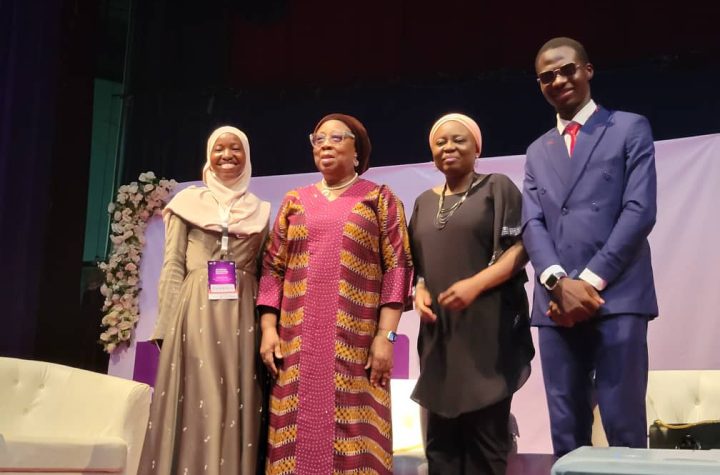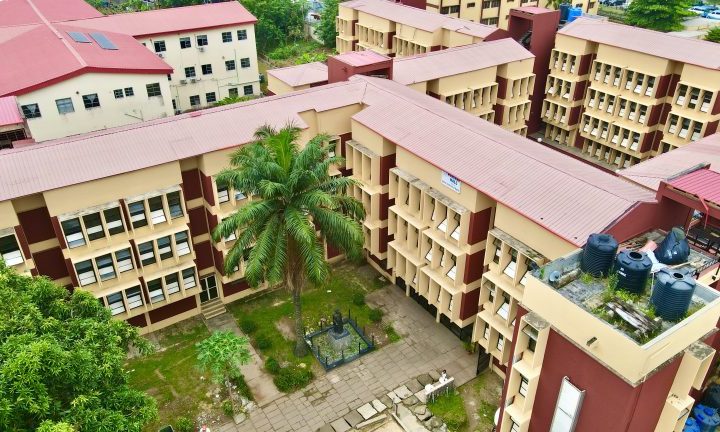
By Faith Enang, Seyifunmi Soremekun, Blessing Famose, Peace Chenube, and Seun Abubakre

It has been a little over one year since Professor Folasade Ogunsola assumed office as the 13th Vice-Chancellor of the University of Lagos (UNILAG) and the 1st female to ever do it. Unilag Sun reporters Faith Enang, Seyifunmi Soremekun, Blessing Famose, Peace Chenube, and Oluwaseun Abubakre engage her in a conversation as she reminisces on the past year.
You’ve spent over one year in office now. How has the journey been so far?
I look back, and I’m grateful for where we are. I came when things couldn’t be worse for university education funding. Even though people did not appreciate it, the university has been bleeding for the past decade. We’ve been paying the same amount yearly—twenty thousand—as mandatory fees. That was one of the first decisions I had to make. People don’t see how much we need to spend to keep this community moving, and when you come, you realise that what you have won’t take you far. You have two decisions to make: compromise on standards and go down, or take the decisions that you know you’re going to have push-backs on because nobody likes change.
The first thing was reintroducing conferences for staff because even our [internally generated revenue] IGR was being used to support students. It was no longer doing anything for faculty staff, and you don’t have a university when you do not have faculty. One of the things I came into was that we must find a way to ensure that we continue to have students who can compete globally and even locally because the world is now small.
The most challenging time for me was the fee hike period because people complained about where they would get the money to pay. Nobody asked ‘Where will the university get the money to function?’ because nothing was changing. I heard a lot of ‘Oh let the poor breathe’, and I had an answer to that—so if you’re poor, should you get a poor quality of education?
So when I look back on the last year, I acknowledge that we did not have as much money as we would have liked, but that we were able to do some things because of the human spirit. The human spirit from staff and the human spirit from students, because a lot of things happened, and I had a vision for where I wanted the University to go.
Last year, when I look back, was a year of hard decisions, a year of consolidation, a year of sowing seeds. This year, I’m expecting some of those seeds to flourish.
What are these staff accommodation projects and training conferences?
The quality of a university is based on the quality of its faculty which would translate to the quality of the end products which is what we pass to students but also in terms of the value we add to national development. So I believe that when we talk about university, we say ‘it’s all about the students’ but I say no, you can have a university that doesn’t have students if they are more focused on national development, not manpower development.
What we try to do is, get some grants that would allow for upskilling both staff and also students. For example, we paid for a Licence on Coursera, and we’ve sent out notices to staff and, later, a notice to students for them to also key into it. But it’s not enough for staff to be smart.
When you come into a university, you are expected to do several things including research. Your promotions are based on research and publications, the reputation that you have and, if possible, added income from the quality of your research and citation. Citation means that people are interested in what you are writing, they’re reading it, and using it. We expect them to facilitate knowledge; that’s not intuitive, so we decided that we’re going to upskill staff in the area of research.
The last one is to teach skills to augment income and aid them in retirement. We have especially too many people retiring, and they are poor. The pension doesn’t carry you anywhere so people must have second streams of income before they leave. Coursera has started, and we’ve started the career support for students. Unfortunately, Nigeria has become such that bad behaviour has been normalised.
There are many things we couldn’t do while I was growing up, and it’s not just about greeting people, we also created a society that worships money. If you chase money, you won’t get it for so long. I also see myself in many ways because I was coming when the staff were very demotivated, the country is just hard for everybody. I’m very passionate about people building, and I also recognise there is no easy way to build people.
Can you please speak briefly about accommodation at the University of Lagos?
Hostels are difficult to get. In UNILAG in particular, we don’t have land, and the land around is also waterlogged. The cost of building a hostel is part of the challenges we’re having.
In 2013, I wanted to build a hostel at Idi-araba, and the hostel was going to be just about 240+ bed spaces because we didn’t have space and it had to go up. But because the earth’s area was not great, the amount spent on the foundation was quite a lot. While we were still negotiating and talking with the builders, they left us and went to Ile-Ife, and with the same money, they built a hostel with about one thousand and five hundred bed spaces. That’s the challenge we are facing in Lagos.
For Gbajabiamila, the reason why the price will not be so bad is that it was built by a government official. If it had been a private contractor that built it, then it couldn’t be less than eight hundred per person because of the amount of work that went underground before the foundation, like piling.
In an interview, you mentioned a special arrangement with the Lagos BRT system to ease students’ transport. Can you shed more light on that?
Yes, not only the students; it will be students and staff. They will move them from Berger to here, and then from the Ipaja side to Oshodi. We wanted them to start a lot earlier but they said people were on holiday. But now that school is in full session, I am almost sure that would have started. I will cross-check, but I think it has started. It is supposed to last throughout the session; we have done it before. It is not the first time, we just reactivated it.
Some students had to defer their admission last session because they couldn’t register for their courses even after complaining. Could you explain why?
The ones that had to defer never registered. We can check your print on the portal even if you opened it once, whether you ever engaged around that. We understand it was a computer glitch, but there was no evidence you did registration. We can check at the backend those who engaged, the day and time that they engaged, so go back there and look.
Last year, we decided to make a point because if you were abroad, once they close the portal, it is closed. Part of it is also about accountability and responsibility. We had opened that portal four times last year, so if anybody didn’t register those four times, we just concluded that person was unserious. Tell them that this year, when we say we’re not opening at a time, it won’t change. We have to be disciplined.
I also believe that a part of the greatest challenges we have in Nigeria is impunity. It’s a thing we complain about this generation. People do and think they can get away with anything and we have to stop it. It starts with you guys, you are my responsibility.
I can’t stop those who are in different offices but our character is what we do every time and it starts now. If you are not disciplined with small things, you won’t be disciplined with big things because you’ve taught yourself that habit.
‘In deed, and in truth,’ that’s character. That’s part of our job, not just school. So, I wish you well.





More Stories
Podium Maiden Edition Ends with Mass Communication Win
Students to Ballot for Mariere Next Week, Fee Remains 43,000
UMCAA organises free 3-day workshop